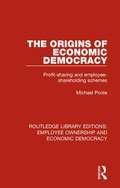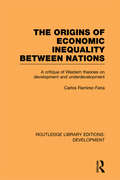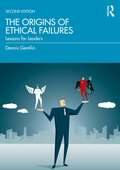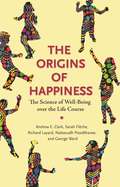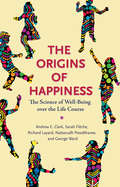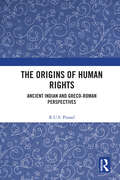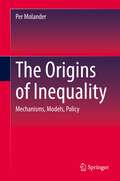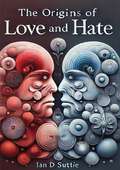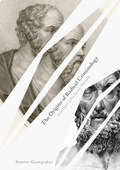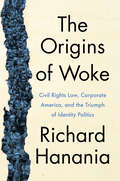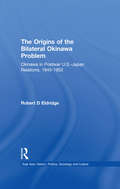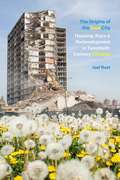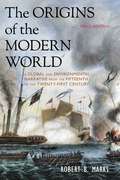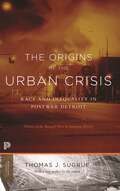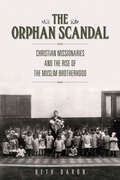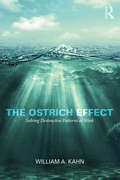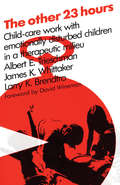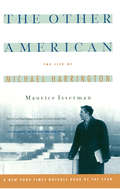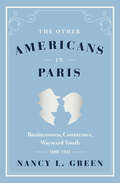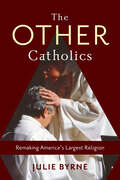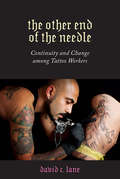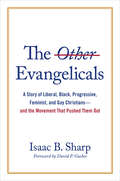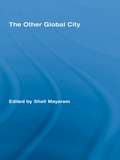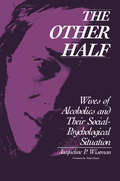- Table View
- List View
The Origins of Economic Democracy: Profit Sharing and Employee Shareholding Schemes (Routledge Library Editions: Employee Ownership and Economic Democracy #9)
by Michael PooleThis work, originally published in 1989, examines a highly important phenomenon: the growth of profit-sharing and share-ownership schemes for employees within the company. The Origins of Economic Democracy traces the origins and developments of such schemes internationally, and presents an explanatory framework for understanding their emergence. Both legislation and economic conditions play key roles in determining the popularity of such schemes for companies and their employees. The subject of profit-sharing is of vital importance to companies endeavouring to improve their financial performance while increasing the degree of job satisfaction and organizational loyalty of staff members.
The Origins of Economic Inequality Between Nations: A Critique of Western Theories on Development and Underdevelopment (Routledge Library Editions: Development)
by Carlos Ramirez-FariaFirst published in 1991 this text provides an incisive analysis of theories concerning the origins of economic inequality between nations. Central to the author’s investigation is the concept of underdevelopment, and a focus on successive Western ‘systems of conceptualisation’ of the relationship between the west and the rest of the world. The first part of the book concerns the Marx/Engels theory of the Asiatic mode of production, and the anti-Imperialist reaction against Eurocentrisim initiated by the theoretical synthesis of J. A. Hobson. This is followed by an examination of the post-World War II era, particularly the evolution of development studies and the differing versions of dependency theory. The author concludes with an analysis of the most recent reactions against economic imperialism and dependency theory, and concludes with an assessment of their implications for the further economic development of today’s Third World.
The Origins of Ethical Failures: Lessons for Leaders
by Dennis GentilinIn this thoroughly updated new edition of his ground-breaking and award-winning book, Dennis Gentilin draws on both his personal experience as a well-known whistleblower and recent events in the Australian financial services industry to provide insights into how widespread, systemic ethical failure can take hold in an industry and, crucially, what leaders need to focus on to avoid it. In 2001, as a young university graduate, Dennis Gentilin became a member of an FX trading desk at one of Australia’s largest banks, the National Australia Bank. In the years that followed, the desk became involved in a trading scandal that resulted in the resignation of the chairman and CEO, the collapse of the board, significant financial loss and incalculable reputational damage. Over the past decade, the frequency of ethical failure within the Australian financial services industry has only increased. Among other failures, there have been multiple breaches of the Anti-Money Laundering and Counter-Terrorism Financing Act, rigging of the benchmark BBSW interest rate, mis-selling of consumer credit insurance and predatory sales practices. In this new edition, Gentilin draws on experimental research from economics and finance to illustrate how, when the conditions are permissive, humans have a predisposition towards dishonesty, and therefore, to reduce the likelihood of ethical failure, leaders must focus obsessively on putting in place appropriate institutional arrangements. Gentilin’s combination of intellectual rigour and real-life reflections makes this book a must-read for students, practitioners and leaders alike who would like to develop a deeper understanding of corporate ethics, governance and conduct.
The Origins of Happiness: The Science of Well-Being over the Life Course
by Andrew Clark Richard Layard Sarah Flèche Nattavudh Powdthavee George WardA new perspective on life satisfaction and well-being over the life courseWhat makes people happy? The Origins of Happiness seeks to revolutionize how we think about human priorities and to promote public policy changes that are based on what really matters to people. Drawing on a range of evidence using large-scale data from various countries, the authors consider the key factors that affect human well-being, including income, education, employment, family conflict, health, childcare, and crime. The Origins of Happiness offers a groundbreaking new vision for how we might become more healthy, happy, and whole.
The Origins of Happiness: The Science of Well-Being over the Life Course
by Richard Layard Andrew E. Clark Sarah Flèche Nattavudh Powdthavee George WardWhat makes people happy? Why should governments care about people’s well-being? How would policy change if well-being was the main objective? The Origins of Happiness seeks to revolutionize how we think about human priorities and to promote public policy changes that are based on what really matters to people. Drawing on a uniquely comprehensive range of evidence from longitudinal data on over one hundred thousand individuals in Britain, the United States, Australia, and Germany, the authors consider the key factors that affect human well-being.The authors explore factors such as income, education, employment, family conflict, health, childcare, and crime—and their findings are not what we might expect. Contrary to received wisdom, income inequality accounts for only two percent or less of the variance in happiness across the population; the critical factors affecting a person’s happiness are their relationships and their mental and physical health. More people are in misery due to mental illness than to poverty, unemployment, or physical illness. Examining how childhood influences happiness in adulthood, the authors show that academic performance is a less important predictor than emotional health and behavior, which is shaped tremendously by schools, individual teachers, and parents. For policymakers, the authors propose new forms of cost-effectiveness analysis that places well-being at center stage.Groundbreaking in its scope and results, The Origins of Happiness offers all of us a new vision for how we might become more healthy, happy, and whole.
The Origins of Human Rights: Ancient Indian and Greco-Roman Perspectives
by R.U.S PrasadThis book studies the history of intercultural human rights. It examines the foundational elements of human rights in the East and the West and provides a comparative analysis of the independent streams of thought originating from the two different geographic spaces. It traces the genesis of the idea of human rights back to ancient Indian and Greco-Roman texts, especially concepts such as the Rigvedic universal moral law, the Upanishadic narratives, the Romans’ model of governance, the rule of law, and administration of justice. It also looks at Cicero’s concept of rights and duties which focuses on quality of compassion and fair play, and Seneca’s expositions on mercy, empathy, justice and checks on the arbitrary exercise of power. An important contribution, this book fills a significant gap in the study of human rights. It will be useful for students and researchers of political science, ancient history, religion and civilizations, philosophy, history, human rights, governance, law, sociology, and South Asian studies. The book also caters to general readers interested in the history of human rights.
The Origins of Inequality: Mechanisms, Models, Policy
by Per MolanderThis book presents a unified approach to the problem of inequality, combining results from a variety of research fields – the human life cycle, group dynamics, networks, markets, and economic geography. Its main message is that inequality emerges as the natural result of mechanisms operating both in individual human development and in social interaction. It posits that inequality is not an anomalous deviation from a naturally egalitarian social structure; quite to the contrary, inequality is to be expected as part of the human condition. The author states that the growth of inequality, on the other hand, is not a natural law – the level and character of inequality can be affected by collective decisions. This perspective on human inequality has potentially far-reaching consequences both for the political philosophy of inequality and for public policy-making.This book is of interest to a wide interdisciplinary social science readership, including public policy, decision sciences, economic geography, and life course studies.
The Origins of Love and Hate
by Ian D Suttie Dr J. A. HadfieldThe Origins of Love and Hate by Ian D. Suttie offers a groundbreaking exploration of the psychological roots of human emotions, particularly focusing on love, hate, and their profound influence on relationships and mental health. Written in the early 20th century, this influential work challenges Freudian views of psychoanalysis by emphasizing the importance of emotional connection and social bonds in psychological development.Suttie’s central thesis is that human beings have a fundamental need for affection, which shapes emotional health from infancy through adulthood. He argues that early disruptions in nurturing relationships—particularly between mother and child—can lead to emotional conflict, producing feelings of rejection, hostility, or repressed hate. Suttie critiques Freud’s emphasis on instinctual drives, such as the death instinct, and instead highlights the role of love and attachment in shaping human behavior and personality.Throughout the book, Suttie provides insights into how unresolved emotional needs manifest in adult relationships, often causing psychological distress and alienation. His work foreshadows later developments in attachment theory and relational psychoanalysis, emphasizing the healing potential of empathy, love, and meaningful connection in therapeutic practice.Dr. J. A. Hadfield’s foreword contextualizes Suttie’s ideas within the broader field of psychoanalysis, acknowledging the originality and influence of his thought. The Origins of Love and Hate remains relevant to psychologists, therapists, and readers interested in human behavior, offering timeless insights into the emotional foundations of relationships.This work invites readers to reflect on how love, attachment, and rejection shape human experience and suggests that healing comes through restoring emotional bonds, making it an essential read for those interested in the psychology of emotions and relational well-being.
The Origins of Radical Criminology: From Homer to Pre-Socratic Philosophy
by Stratos GeorgoulasThis book critically explores the development of radical criminology through a range of written Ancient Greek works including epic and lyrical poetry, drama and philosophy, across different chapters. It traces the development of political power and the concepts of law, legitimacy, crime, justice and deviance in the Ancient Greek world and the political struggles that propelled that development, using the conflict perspective as a conceptual tool of the sociological analysis of reality. Theoretical discussions of crime and justice typically stem from the better known works of Plato or Aristotle although this book explores the works preceding these. This book will appeal to those interested in the (pre)history of criminology and the historical production of criminological knowledge.
The Origins of Woke: Civil Rights Law, Corporate America, and the Triumph of Identity Politics
by Richard HananiaRichard Hanania has emerged as one of the most talked-about writers in the nation, and in this book, he puts forward a stunning new theory about the culture war that could turn our debates upside down. Richard Hanania has come out of nowhere to become one of the best-known writers in the nation in the last few years. In this book, he directs his attention to the culture war that has driven society apart and presents a stunning new theory about what is going on.In a nation nearly-evenly split between conservatives and liberals, the left dominates nearly all major institutions, including universities, the government, and corporate America. Hanania argues that this is as much a legal requirement as it is an issue of one side triumphing in the marketplace of ideas. Culture has its own independent force, but the state has, since the 1960s, been putting its thumb on the scale. This book answers many of the puzzling questions about modern society, such as:• Why does more and more of life seem like a competition to see who is the most oppressed?• Who is really behind the sudden proliferation of woke ideas?• How did ideas that seem so intellectually bankrupt achieve hegemony over elite culture?• Which laws and regulations have helped the left rise to power everywhere?• How did workplaces come to be the main enforcers of political ideology?• When and how did Pakistanis, Samoans, and Koreans all become the same "race" (AAPI)? • Why did America become so obsessed with inequalities based on race but not religion? For those angry about wokeness and what it has done to American institutions, this book offers concrete suggestions regarding policies that can move us back to being a country that emphasizes merit, individual liberty, and color-blind governance.
The Origins of the Bilateral Okinawa Problem: Okinawa in Postwar US-Japan Relations, 1945-1952 (East Asia)
by Robert D. EldridgeUsing a multi-national and multi-archival approach to this diplomatic history study, the author examines comprehensively and in great detail for the first time the origins of the so-called Okinawa Problem. Also inlcludes four maps.
The Origins of the Dual City: Housing, Race, and Redevelopment in Twentieth-Century Chicago
by Joel RastChicago is celebrated for its rich diversity, but, even more than most US cities, it is also plagued by segregation and extreme inequality. More than ever, Chicago is a “dual city,” a condition taken for granted by many residents. In this book, Joel Rast reveals that today’s tacit acceptance of rising urban inequality is a marked departure from the past. For much of the twentieth century, a key goal for civic leaders was the total elimination of slums and blight. Yet over time, as anti-slum efforts faltered, leaders shifted the focus of their initiatives away from low-income areas and toward the upgrading of neighborhoods with greater economic promise. As misguided as postwar public housing and urban renewal programs were, they were born of a long-standing reformist impulse aimed at improving living conditions for people of all classes and colors across the city—something that can’t be said to be a true priority for many policymakers today. The Origins of the Dual City illuminates how we normalized and became resigned to living amid stark racial and economic divides.
The Origins of the Modern World: A Global and Environmental Narrative
by Robert B. MarksThis clearly written and engrossing book presents a global narrative of the origins of the modern world from 1400 to the present. Unlike most studies, which assume that the rise of the West is the story of the coming of the modern world, this history, drawing upon new scholarship on Asia, Africa, and the New World and upon the maturing field of environmental history, constructs a story in which those parts of the world play major roles, including their impacts on the environment. Robert B. Marks defines the modern world as one marked by industry, the nation state, interstate warfare, a large and growing gap between the wealthiest and poorest parts of the world, increasing inequality within the wealthiest industrialized countries, and an escape from the environmental constraints of the biological old regime. He explains its origins by emphasizing contingencies (such as the conquest of the New World); the broad comparability of the most advanced regions in China, India, and Europe; the reasons why England was able to escape from common ecological constraints facing all of those regions by the eighteenth century; a conjuncture of human and natural forces that solidified a gap between the industrialized and non-industrialized parts of the world; and the mounting environmental crisis that defines the modern world. Now in a new edition that brings the saga of the modern world to the present in an environmental context, the book considers how and why the United States emerged as a world power in the twentieth century and became the sole superpower by the twenty-first century, and why the changed relationship of humans to the environmental likely will be the hallmark of the modern era the Anthropocene. Once again arguing that the U. S. rise to global hegemon was contingent, not inevitable, Marks also points to the resurgence of Asia and the vastly changed relationship of humans to the environment that may in the long run overshadow any political and economic milestones of the past hundred years.
The Origins of the Urban Crisis: Race and Inequality in Postwar Detroit - Updated Edition (Princeton Classics #6)
by Thomas J. SugrueThe reasons behind Detroit’s persistent racialized poverty after World War IIOnce America's "arsenal of democracy," Detroit is now the symbol of the American urban crisis. In this reappraisal of America’s racial and economic inequalities, Thomas Sugrue asks why Detroit and other industrial cities have become the sites of persistent racialized poverty. He challenges the conventional wisdom that urban decline is the product of the social programs and racial fissures of the 1960s. Weaving together the history of workplaces, unions, civil rights groups, political organizations, and real estate agencies, Sugrue finds the roots of today’s urban poverty in a hidden history of racial violence, discrimination, and deindustrialization that reshaped the American urban landscape after World War II.This Princeton Classics edition includes a new preface by Sugrue, discussing the lasting impact of the postwar transformation on urban America and the chronic issues leading to Detroit’s bankruptcy.
The Orphan Scandal: Christian Missionaries and the Rise of the Muslim Brotherhood
by Beth BaronOn a sweltering June morning in 1933 a fifteen-year-old Muslim orphan girl refused to rise in a show of respect for her elders at her Christian missionary school in Port Said. Her intransigence led to a beating#151;and to the end of most foreign missions in Egypt#151;and contributed to the rise of Islamist organizations. Turkiyya Hasan left the Swedish Salaam Mission with scratches on her legs and a suitcase of evidence of missionary misdeeds. Her story hit a nerve among Egyptians, and news of the beating quickly spread through the country. Suspicion of missionary schools, hospitals, and homes increased, and a vehement anti-missionary movement swept the country. That missionaries had won few converts was immaterial to Egyptian observers: stories such as Turkiyya's showed that the threat to Muslims and Islam was real. This is a great story of unintended consequences: Christian missionaries came to Egypt to convert and provide social services for children. Their actions ultimately inspired the development of the Muslim Brotherhood and similar Islamist groups. In The Orphan Scandal, Beth Baron provides a new lens through which to view the rise of Islamic groups in Egypt. This fresh perspective offers a starting point to uncover hidden links between Islamic activists and a broad cadre of Protestant evangelicals. Exploring the historical aims of the Christian missions and the early efforts of the Muslim Brotherhood, Baron shows how the Muslim Brotherhood and like-minded Islamist associations developed alongside and in reaction to the influx of missionaries. Patterning their organization and social welfare projects on the early success of the Christian missions, the Brotherhood launched their own efforts to "save" children and provide for the orphaned, abandoned, and poor. In battling for Egypt's children, Islamic activists created a network of social welfare institutions and a template for social action across the country#151;the effects of which, we now know, would only gain power and influence across the country in the decades to come.
The Ostrich Effect: Solving Destructive Patterns at Work
by William A. KahnThe Ostrich Effect goes beyond the typical "how to" approach of most books that deal with difficult conversations at work. It aims to teach the reader what conversations to have, and when to have them, in order to solve destructive problems that occur in the workplace. Like the proverbial ostrich with its head in the sand, people often avoid confronting small issues at work, but, if avoided, these issues will escalate and inevitably wreak havoc. Drawing on a combination of social science research and Kahn’s practical experience as an organizational psychologist, the book examines the micro-processes that underlie the way in which these problems develop and flourish. These micro-processes are tiny, fleeting, and hardly noticeable, but when they are identified, something startling becomes apparent: there is a predictable pattern to this escalation. The book uses a variety of examples to demonstrate this pattern across a range of organizations and industries, and offers a toolkit to help guide the reader in resolving people problems at work. The toolkit focuses not on changing others, but on changing how we interact with others—our own behavior is the most powerful force for change that we have. The ostrich remains the symbol of those of us who foolishly ignore our problems while hoping that they will magically disappear. By identifying this "ostrich effect", the reader is empowered to re-frame and neutralize its impact.
The Other 23 Hours: Child Care Work with Emotionally Disturbed Children in a Therapeutic Milieu (Modern Applications Of Social Work Ser.)
by Larry BrendtroAmong other revolutionary developments of today's world is the so-called "knowledge explosion". So much is being written so fast about so many things that it is becoming well-nigh ir--retrievable. One consequently can never be sure that he knows what there is to know about many kinds of phenomena or types of problems existing in the modern world due to the chance that something exists in written form that simply cannot be found, so bulky is the load of literature. The common idea that only the sick child, and never the well, needs special emotional supports and helps from the adult is simply an error. For the well child is not immune from pile-ups of severe emotional intensity when overwhelmed by confusion and conflicts from within. Certainly, the normal kid can be ex--pected to handle such crises either from within or without better than his sick peer on the average, but that does not mean always; and the critical issue for the well child is: is he ready at the time they hit? If not, he needs, quite unmistakably, emotional first aid from the adult - parent, teacher, camp counsellor (or what have you) - who is in charge of his life at that moment. The reader will find that what the authors describe in The Other 23 Hours as the everyday requirement diet, as far as child handling is concerned for their disturbed children, is transferable to the normal crises of normal child--hood.
The Other American
by Maurice IssermanMost Americans first heard of Michael Harrington with the publication of The Other America, his seminal book on American poverty. Isserman expertly tracks Harrington's beginnings in the Catholic Worke
The Other Americans in Paris: Businessmen, Countesses, Wayward Youth, 1880–1941
by Nancy L. GreenA &“thorough and perceptive&” portrait of the not-so-famous expatriates of the City of Light (The Wall Street Journal). History may remember the American artists, writers, and musicians of the Left Bank best, but the reality is that there were many more American businessmen, socialites, manufacturers&’ representatives, and lawyers living on the other side of the River Seine. Be they newly minted American countesses married to foreigners with impressive titles or American soldiers who had settled in France after World War I with their French wives, they provide a new view of the notion of expatriates. Historian Nancy L. Green introduces us for the first time to a long-forgotten part of the American overseas population—predecessors to today&’s expats—while exploring the politics of citizenship and the business relationships, love lives, and wealth (or in some cases, poverty) of Americans who staked their claim to the City of Light. The Other Americans in Paris shows that elite migration is a part of migration, and that debates over Americanization have deep roots in the twentieth century.
The Other Catholics: Remaking America's Largest Religion
by Julie ByrneIndependent Catholics are not formally connected to the pope in Rome. They practice apostolic succession, seven sacraments, and devotion to the saints. But without a pope, they can change quickly and experiment freely, with some affirming communion for the divorced, women's ordination, clerical marriage, and same-sex marriage. From their early modern origins in the Netherlands to their contemporary proliferation in the United States, these "other Catholics" represent an unusually liberal, mobile, and creative version of America's largest religion.In The Other Catholics, Julie Byrne shares the remarkable history and current activity of independent Catholics, who number at least two hundred communities and a million members across the United States. She focuses in particular on the Church of Antioch, one of the first Catholic groups to ordain women in modern times. Through archival documents and interviews, Byrne tells the story of the unforgettable leaders and surprising influence of these understudied churches, which, when included in Catholic history, change the narrative arc and total shape of modern Catholicism. As Pope Francis fights to soften Roman doctrines with a pastoral touch and his fellow Roman bishops push back with equal passion, independent Catholics continue to leap ahead of Roman reform, keeping key Catholic traditions but adding a progressive difference.
The Other Catholics: Remaking America's Largest Religion
by Julie Byrne&“An excellent study of churches on the fringe that incubate new ideas and shed new light on mainstream religion.&”—Times Higher Education Independent Catholics are not formally connected to the pope in Rome. They practice apostolic succession, seven sacraments, and devotion to the saints. But without a pope, they can change quickly and experiment freely—with some affirming communion for the divorced, women&’s ordination, clerical marriage, and same-sex marriage. From their early modern origins in the Netherlands to their contemporary proliferation in the United States, these &“other Catholics&” represent an unusually liberal, mobile, and creative version of America&’s largest religion. In The Other Catholics, Julie Byrne shares the remarkable history and current activity of independent Catholics, who number at least two hundred communities and a million members across the United States. She focuses in particular on the Church of Antioch, one of the first Catholic groups to ordain women in modern times. Through archival documents and interviews, Byrne tells the story of the unforgettable leaders and surprising influence of these understudied churches, which, when included in Catholic history, change the narrative arc and total shape of modern Catholicism. As Pope Francis fights to soften Roman doctrines with a pastoral touch and his fellow Roman bishops push back with equal passion, independent Catholics continue to leap ahead of Roman reform, keeping key Catholic traditions but adding a progressive difference. &“Byrne&’s enlightening research and analysis will undoubtedly raise awareness of these little-known Catholic denominations.&”
The Other End of the Needle: Continuity and Change among Tattoo Workers (Inequality at Work: Perspectives on Race, Gender, Class, and Labor)
by David C. LaneThe Other End of the Needle demonstrates that tattooing is more complex than simply the tattoos that people wear. Using qualitative data and an accessible writing style, sociologist Dave Lane explains the complexity of tattoo work as a type of social activity. His central argument is that tattooing is a social world, where people must be socialized, manage a system of stratification, create spaces conducive for labor, develop sets of beliefs and values, struggle to retain control over their tools, and contend with changes that in turn affect their labor. Earlier research has examined tattoos and their meanings. Yet, Lane notes, prior research has focused almost exclusively on the tattoos—the outcome of an intricate social process—and have ignored the significance of tattoo workers themselves. "Tattooists," as Lane dubs them, make decisions, but they work within a social world that constrains and shapes the outcome of their labor—the tattoo. The goal of this book is to help readers understand the world of tattoo work as an intricate and nuanced form of work. Lane ultimately asks new questions about the social processes occurring prior to the tattoo’s existence.
The Other Evangelicals: A Story of Liberal, Black, Progressive, Feminist, and Gay Christians—and the Movement That Pushed Them Out
by Isaac B. SharpWhat&’s the first thing that comes to mind when you hear &“evangelical&”?For many, the answer is &“white,&” &“patriarchal,&” &“conservative,&” or &“fundamentalist&”—but as Isaac B. Sharp reveals, the &“big tent&” of evangelicalism has historically been much bigger than we&’ve been led to believe. In The Other Evangelicals, Sharp brings to light the stories of those twentieth-century evangelicals who didn&’t fit the mold, including Black, feminist, progressive, and gay Christians.Though the binary of fundamentalist evangelicals and modernist mainline Protestants is taken for granted today, Sharp demonstrates that fundamentalists and modernists battled over the title of &“evangelical&” in post–World War II America. In fact, many ideologies characteristic of evangelicalism today, such as &“biblical womanhood&” and political conservatism, arose only in reaction to the popularity of evangelical feminism and progressivism. Eventually, history was written by the &“winners&”—the Billy Grahams of American religion—while the &“losers&” were expelled from the movement via the establishment of institutions such as the National Association of Evangelicals.Carefully researched and deftly written, The Other Evangelicals offers a breath of fresh air for scholars seeking a more inclusive history of religion in America.
The Other Global City (Routledge Advances in Geography)
by Shail MayaramWhat is a Global City? Who authorizes the World Class City? This edited volume interrogates the "global cities" literature, which views the city as a shimmering, financial "global network." Through a historical-ethnographic exploration of inter-ethnic relations in the "other global" cities of Cairo, Beirut, Istanbul, Bukhara, Lhasa, Delhi, Singapore, Kuala Lumpur and Tokyo, the well-known contributors highlight cartographies of the Other Global City. The volume contends that thinking about the city in the longue duree and as part of a topography of interconnected regions contests both imperial and nationalist ways of reading cities that have occasioned the many and particularly violent territorial partitions in Asia and the world.
The Other Half: Wives of Alcoholics and Their Social-Psychological Situation
by Jacqueline WisemanThis current study has emerged from two decades of the author's investigations in related areas: alcoholism and domestic relations. Its canvas is broadly comparative, drawing on interviews and data gathered in the United States and Finland. The domestic drama of The Other Half is played out both in the private scene of the home and the more public scene of the workplace, and against these two differing national backgrounds. Despite the many expected and perceived cultural differences between the countries, the effects of alcoholism on the family are shown to be the same.Dr. Wiseman's study offers theoretical insights gleaned from its perspective on alcoholism as an interactive phenomenon,to which the concepts of G.H. Mead and Blumer can be applied to illuminate the carefully presented data and go beyond them. New terrain in studies of alcoholism is thereby explored, including such themes as the social construction by the subjects of their husbands' drinking, their marriage and their self-images; the strategy of coping mechanisms; and the effects of the crisis of alcoholism on gender, sex roles, and power differentials.The Other Half complements Dr. Wiseman's prize-winning work on the treatment of Skid Row alcoholics, Stations of the Lost, while involving issues of greater complexity on both the methodological and theoretical plane.
